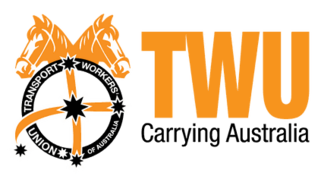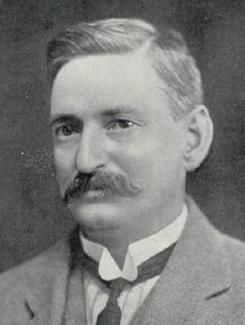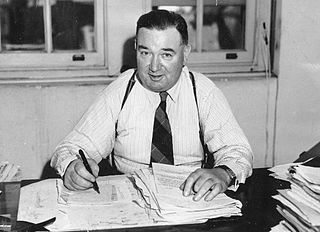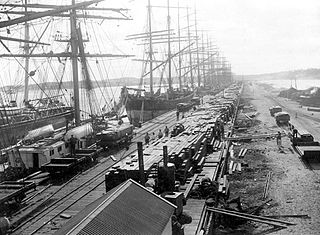Permanent and Casual Wharf Labourers' Union of Australia | |
| Merged into | Waterside Workers' Federation |
|---|---|
| Founded | 1917 |
| Dissolved | 1950 |
| Location | |
The Permanent & Casual Wharf Labourers Union of Australia (PCWLU) was an Australian union for maritime labourers.
The Union was established in opposition to the Waterside Workers' Federation of Australia. Branches were founded by "loyalists" in Sydney in response to the General Strike of 1917 and amalgamated in 1919. [1] [2] The union was not affiliated with Trades Hall, [3] and was subsequently registered in 1926 under the Australian Conciliation and Arbitration Act (1904), and reregistered in the following year. [4] [5] Conflict between the two unions erupted into physical violence in 1931 on the steamer Kowarra moored at Lee Wharf in Newcastle. [6] In 1946 the union applied for affiliation with its rival but was rebuffed on the charge that they were communist-controlled, [2] and was eventually deregistered in 1950 [4] after merging as a distinct branch of the Waterside Workers' Federation of Australia. [7]
Officials included:

The Transport Workers Act 1928 (Cth), more widely known as the Dog Collar Act, was a law passed by the Australian Parliament. It achieved royal assent on 24 September 1928, after being instigated and introduced to Parliament by the Bruce government. It was ostensibly "relating to employment in relation to trade and commerce with other countries and among the states", which mirrors the wording of Section 51(i) of the Constitution of Australia.

The 1951 New Zealand waterfront dispute was the largest and most widespread industrial dispute in New Zealand history. During the time, up to twenty thousand workers went on strike in support of waterfront workers protesting against financial hardships and poor working conditions. Thousands more refused to handle "scab" goods. The dispute was sometimes referred to as the waterfront lockout or waterfront strike. It lasted 151 days, from 13 February to 15 July 1951. During the strike, the Watersiders' Union was deregistered and its funds and records were seized, and 26 local watersiders' unions were set up in its place.
The Australian Workers' Union (AWU) is one of Australia's largest and oldest trade unions. It traces its origins to unions founded in the pastoral and mining industries in the late 1880s and it currently has approximately 80,000 members. It has exercised an outsized influence on the Australian Trade Union movement and on the Australian Labor Party throughout its history.
The Workers' Union was a general union based in the United Kingdom, but with some branches in other countries. During the 1910s, it was the largest general union in the UK, but it entered a rapid decline in the 1920s, and eventually became part of the Transport and General Workers' Union (TGWU).

The Maritime Union of Australia (MUA) was a union which covered waterside workers, seafarers, port workers, professional divers, and office workers associated with Australian ports. The MUA was formed in 1993 with merger of the Seamen's Union of Australia and the Waterside Workers' Federation of Australia.

The Transport Workers' Union of Australia (TWU) is a trade union with members throughout Australia. It has 5 main branches based in: Australian Capital Territory/New South Wales; Queensland; Victoria/Tasmania; South Australia/Northern Territory; and Western Australia.

Sir George Stephenson Beeby KBE was an Australian politician, judge and author. He was one of the founders of the Labor Party in New South Wales, and represented the party in state parliament from 1907 to 1912. He fell out with the party and later served as an independent, a Nationalist, and a Progressive. He left parliament in 1920 to join the state arbitration court, and in 1926 was appointed to the Commonwealth Court of Conciliation and Arbitration. He was Chief Judge from 1939 until his retirement in 1941.

Edward Grayndler was an Australian trade unionist and politician. He served as general secretary of the Australian Workers' Union (AWU) from 1912 to 1941, the longest term in the union's history.

William George Mahony was an Australian politician.
Firemen and Deckhands' Union of New South Wales (FDU) was an Australian trade union existing between 1901 and 1993. The union covered deckhands employed on ferries, tugs, launches, lighters and hoppers, as well as enginemen, wharf hands, turnstill hands, change hands, firemen, motorboat coxmen and assistants. The FDU operated a closed shop, with all labour in the industry provided to employers through the union.

James "Big Jim" Healy was an Australian trade unionist and communist activist. Healy served as General Secretary of the Waterside Workers' Federation of Australia from 1937 to his death in 1961, a period when the union recovered from its defeat in the 1928 waterfront strike to become one of the most powerful trade unions in Australia. Healy was one of the most prominent public representatives of the communist movement in Australia during the Cold War.

Ernest "Ernie" Edward Job Pullin Judd was an Australian socialist, publisher, political writer, and bookseller.

The Federated Ironworkers' Association of Australia (FIA) was an Australian trade union which existed between 1911 and 1991. It represented labourers and semi-skilled workers employed in the steel industry and ironworking, and later also the chemical industry.

The Waterside Workers' Federation of Australia (WWF) was an Australian trade union that existed from 1902 to 1993. After a period of negotiations between other Australian maritime unions, it was federated in 1902 and first federally registered in 1907; its first general president was Billy Hughes.
The Dalfram dispute of 1938 was a political industrial dispute at Port Kembla, New South Wales, protesting the export of pig iron from Australia to Japan during the Second Sino-Japanese War. It became famous for providing the nickname of Pig Iron Bob to Attorney General Robert Menzies, later to serve as Prime Minister.

The Fremantle Lumpers Union was a trade union formed in 1889 and active until 1946 when it became part of the Waterside Workers' Federation, Fremantle Branch. It was the first union to represent unskilled workers formed in Western Australia.
The National Union of Rail Workers of Australia (NUR) was an Australian trade union representing railway industry workers which operated from 1938 until 1993.
The Building Workers' Industrial Union of Australia was an Australian trade union covering workers in the construction industry.

Edward Charles Roach (1909–1997), was an Australian trade unionist, long-time leader of the Waterside Workers' Federation (WWF) and prominent member of the Communist Party of Australia. He was a key organiser of the 1938 Dalfram dispute, when dock workers, concerned with the occupation of China, refused to load ships destined for Japan with Australian pig-iron, a raw material for munitions. He was twice imprisoned for his industrial activity. As a leader in the WWF during the introduction of containerisation, he was responsible for winning significant improvements in working conditions for those in the Australian stevedoring industry.